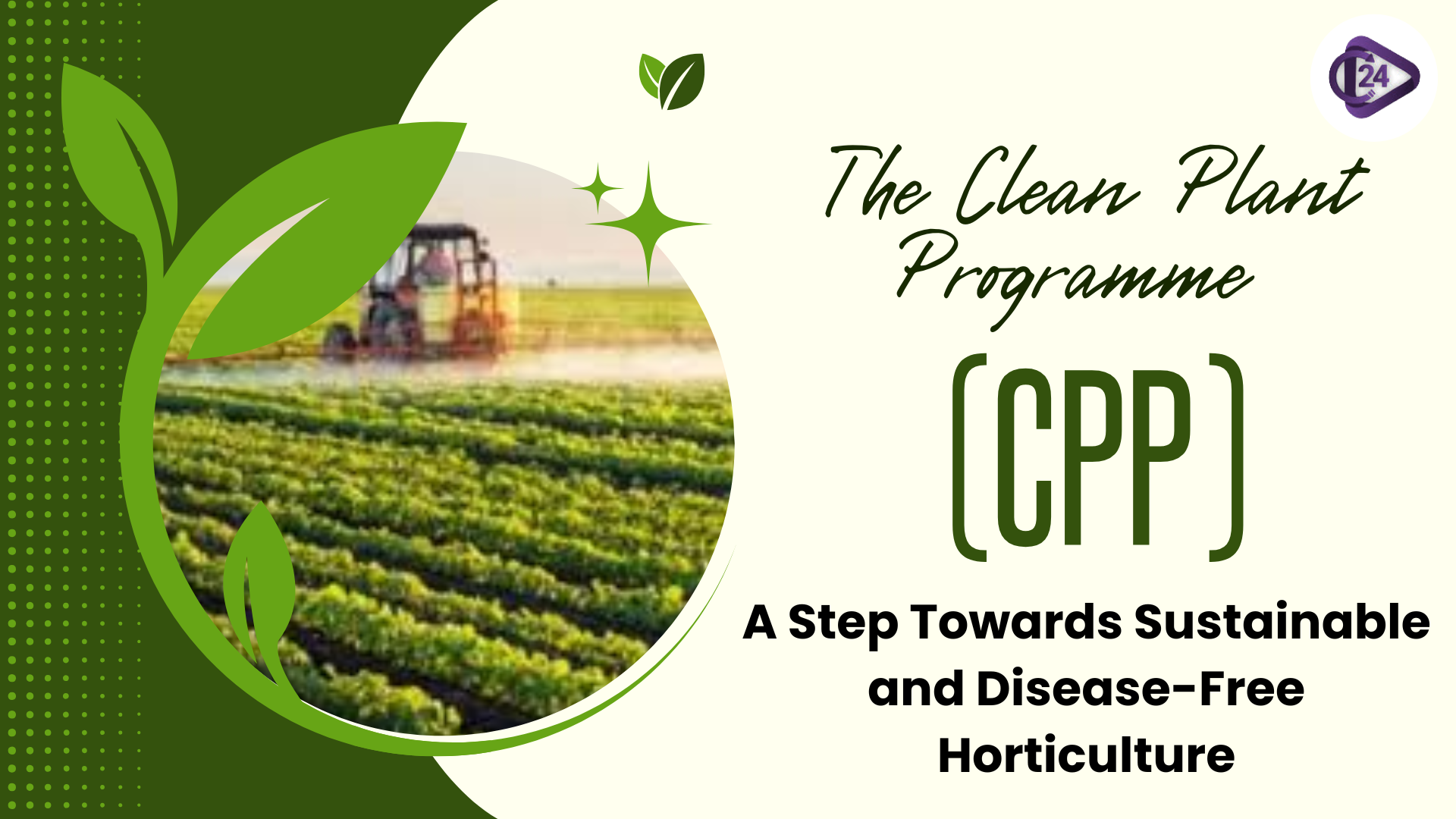
The Clean Plant Programme (CPP), conceptualized by the Ministry of Agriculture & Farmers Welfare in collaboration with the Asian Development Bank (ADB), is moving from vision to action. This initiative aims at providing virus-free, healthy planting material for key fruit crops, ensuring better quality yields and enhancing farmer income opportunities. Several field-level initiatives are underway, including nursery certification, training for authorities, crop-specific diagnostic protocols, and funding guidelines.
Key Features of CPP:
-
For Farmers:
-
Access to Virus-Free Planting Material: Farmers benefit from access to high-quality, virus-free planting material, enhancing crop yields and improving income opportunities.
-
-
For Nurseries:
-
Certification and Support: Streamlined nursery certification processes, along with infrastructure support, enable nurseries to propagate clean planting material effectively, promoting sustainability.
-
-
For Consumers:
-
Superior Produce: The initiative results in virus-free produce, improving the taste, appearance, and nutritional value of fruits available to consumers.
-
-
For Exports:
-
Boosting Global Position: CPP strengthens India’s position as a leading global exporter by focusing on disease-free, high-quality fruits that are in demand worldwide.
-
-
For Equity and Inclusivity:
-
Affordable Access for All Farmers: The programme ensures affordable access to clean planting materials for all farmers, supports women’s participation through training and resources, and develops region-specific varieties suited to India’s diverse agro-climatic conditions.
-
Importance of CPP:
-
Boosting the Horticultural Sector: CPP is set to bolster India’s horticulture sector, aligning with Mission LiFE (Lifestyle for Environment) and the One Health initiatives to promote sustainable and eco-friendly agricultural practices.
-
Climate Change Adaptation: The programme also helps farmers adapt to climate change by addressing rising temperatures, which influence pest and disease behavior. Plant health management through the use of disease-free planting material is key in adapting to climate challenges.
-
Complementing MIDH: The CPP complements the Mission for Integrated Development of Horticulture (MIDH), a centrally sponsored scheme launched in 2014-15 for the holistic growth of the horticulture sector.
Concerns:
-
Climate Change and Plant Diseases: Climate change and plant diseases, especially those caused by viruses, remain significant threats to agricultural productivity. These threats reduce crop yield, quality, and lifespan and are challenging to manage once symptoms appear.
-
Effective Solutions: Using disease-free planting materials is considered the most effective solution to combat these challenges and ensure better crop yield and longevity.
Way Forward:
The Clean Plant Programme (CPP) is steadily progressing, with various initiatives already in place and more planned to extend its impact. The next steps for the programme include:
-
Broader Consultations: Expanding consultations with nurseries for certification.
-
Training and Capacity Building: Development of training modules for relevant authorities to enhance their capacity to implement the programme effectively.
-
Diagnostic Protocols: Establishing hazard analysis protocols for citrus crops and diagnostic protocols for crops such as mango, guava, litchi, avocado, and dragon fruit.
Conclusion
The CPP is a critical initiative for improving the health of India's horticultural sector and ensuring the production of high-quality, disease-free crops. It will play a pivotal role in increasing agricultural productivity, enhancing food security, and contributing to the global market through sustainable farming practices.



 System for Pension Administration – Raksha (SPARSH)
System for Pension Administration – Raksha (SPARSH) Election Commission Delists 474 Unrecognised Political Parties
Election Commission Delists 474 Unrecognised Political Parties Sarnath Nominated for UNESCO World Heritage List 2025-26
Sarnath Nominated for UNESCO World Heritage List 2025-26 Sign Language Day 2025: ISLRTC Launches Key Initiatives for Deaf Inclusion
Sign Language Day 2025: ISLRTC Launches Key Initiatives for Deaf Inclusion Surajpur Achieves Milestone: 75 Villages Declared Child Marriage-Free
Surajpur Achieves Milestone: 75 Villages Declared Child Marriage-Free Modi to Dedicate Dhordo as India’s Newest Solar Village
Modi to Dedicate Dhordo as India’s Newest Solar Village India Adds Seven Natural Heritage Sites to UNESCO’s Tentative List
India Adds Seven Natural Heritage Sites to UNESCO’s Tentative List MNRE Unveils India’s First National Policy on Geothermal Energy
MNRE Unveils India’s First National Policy on Geothermal Energy Raj Gond Tribe Rehearses for Gussadi Dance at Hyderabad Liberation Day
Raj Gond Tribe Rehearses for Gussadi Dance at Hyderabad Liberation Day






